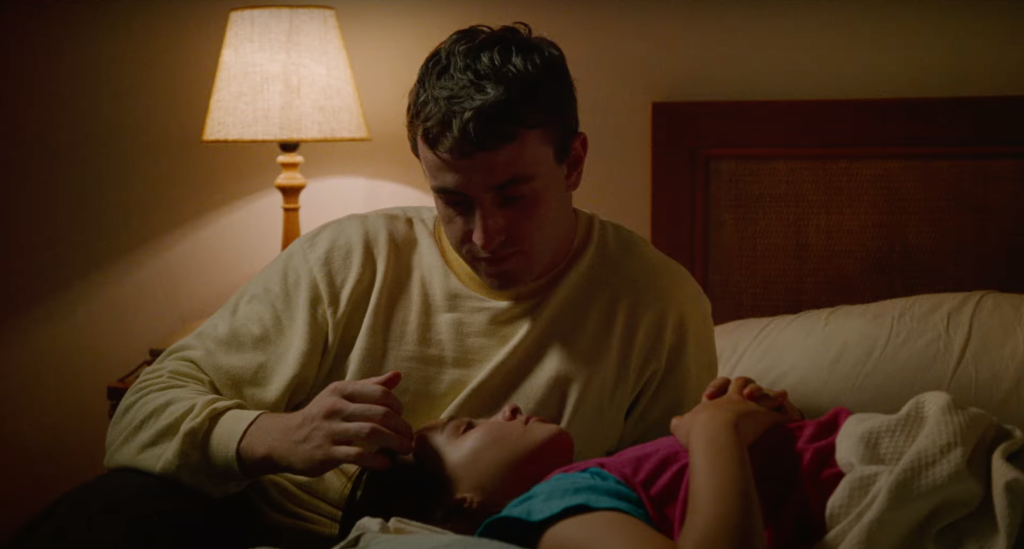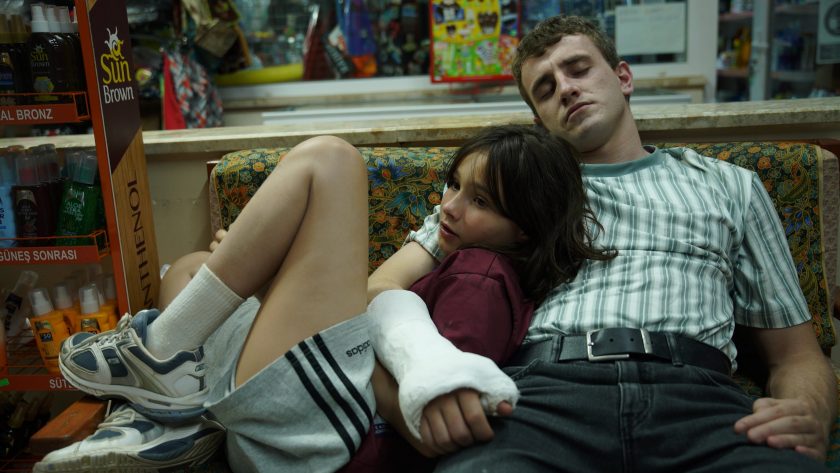BFI’s London Film Festival is in town! The FilmSoc Blog is back for the 66th edition of the city’s largest film festival, delivering a look at the hits and misses of the 2022-23 season.
◯ Warning: this review contains spoilers.
Madeline Choi reviews A24’s newest bawling drama about a father-daughter reconciliation during a trip in Turkey.
Charlotte Wells’ directorial debut Aftersun is a heart-wrenching portrayal of a father-daughter duo, Calum (Paul Mescal) and Sophie (Frankie Corio), and cemented itself as my favourite watch of the festival. At its core, it’s a story about a thirty-year-old woman reminiscing over her holiday in Turkey with her father, which they went on twenty years prior to the present day. Through a collection of old videotapes, the film allows the audience to see Calum through two very different lenses: a camera recorder and young Sophie’s eyes. The film, therefore, blurs the line between memory and filling in the blanks, as well as feelings of immense joy and intense sorrow. A rollercoaster of emotions, this film left me devastated and unable to leave the cinema with dry eyes.
This film essentially feels very human. It’s a story made by a human, told by humans, for humans. It plays on universal emotions and experiences such as love, childhood nostalgia, and heartbreak through a series of cam-recorder footage. Wells almost sneaks up on us: the film is filled to the brim with immense warmth and comfort, through its depiction of a father-daughter holiday, but quite surprisingly stabs us in the back with the film’s darker themes. The film sees a subtle disconnect between Calum and Sophie, as the audience learns that they no longer live together as a family. The banter between the two that fills the theatre with laughter is a distraction from Calum’s underlying struggles with his mental health and addiction- which is something that Sophie only picks up as she becomes an adult. We not only get to see Calum as a father through Sophie’s eyes, but as an unstable human through the film’s filling of the gaps. The gaps presented to us through Sophie’s childhood are nothing short of heartbreaking. The film works as a collage of memories that evokes contrapuntal feelings of warmth and lingering grief as Wells invites Sophie, and by extension, the audience to piece the puzzle together.
The highlight of the film definitely comes from Aftersun‘s performances. With rising star Paul Mescal and a debut performance by Frankie Corio, the two nail the intricacies of a father-daughter relationship. The film, as melancholy as it is, sticks with amazing comedic timing thanks to the two leading performances. Corio’s rather over-the-top attitude as an eleven-year-old girl is perfectly balanced with the more mellow, anxious performance given by Mescal. We, as the audience, can see how much Calum loves his daughter but there is just something so gripping about Mescal’s quiet performance. We can see how despite being on holiday in Turkey, Calum is preoccupied with something. Something that eleven-year-old Sophie can’t seem to put her finger on.

The film’s genius comes from the blending of memory and speculation. It never gives the audience answers but rather, asks us to read between the lines. My favourite scene comes from the transition of two very different dance sequences. We see Calum and Sophie playfully dance along to ‘Under Pressure’ during one of their last nights on holiday in Turkey. One minute, we see the father and daughter burst into laughter with their quite awful dance moves, and the next minute, the lights flicker and we see Calum high on drugs, coping with his struggles in a nightclub. The two scenes mingle as the film switches back and forth from the contrasting sequences. There’s something so poetically heartbreaking about the blending of the two sequences. On one hand, we see Sophie’s favourite memory of her father and on the other, we see Calum’s devastating struggle. The film’s final shot says goodbye to Calum as Sophie begins to let him go; we see him being physically isolated, into a room that represents his addiction and the nightclub, as eleven-year-old Sophie leaves the airport. The pain that radiates off of Sophie’s glorification and humanisation of her father pulls on each and every single heartstring, since that is perhaps the last time she ever got to see her father again.
The film’s beautiful cinematography, by Gregory Oke, complements the film’s script in every way imaginable. The script’s main focus on Turkey is accompanied by shots of a resort that evoke great feelings of nostalgia and childhood. There’s not much regarding the plot of the film. The film’s runtime is mainly centred around the duo’s time in Turkey and a few shots of adult Sophie reminiscing about her father as she turns thirty years old – the age Calum was on their trip to the same country. The quiet plot is paired with calm shots of Turkey, with it being somewhat similar to Wong Kar Wai’s In the Mood for Love (2000)’s shots of Cambodia: beautiful imagery of nature and culture, without a human touch to it. Even the most beautiful shots of the Turkish countryside seem somewhat empty and lonely. There’s one specific shot of Calum, I’d like to mention, of him in a Turkish carpet store. He realises that his favourite one is way too expensive for his budget and so he decides to just lie down on it in the store. The shot then transitions into him, knee-deep in the sea, during the night. The mirroring of the ever-so-detailed, extravagant carpet, and the dark, cold sea showcase Calum’s unstable mental state and the unreliability of the narrator, Sophie. Calum’s confession that he never imagined living to the age of thirty is made out even sadder as Sophie hits thirty, desperate to reflect and reconcile with her father.
Aftersun is my favourite watch from this year’s London Film Festival. With amazing leading performances, a fun soundtrack, and an underlying heartbreaking tone, Charlotte Wells’ directorial debut is hauntingly beautiful: a real punch in the gut.
Aftersun is out tomorrow, 21st October 2022. Watch the trailer here:




